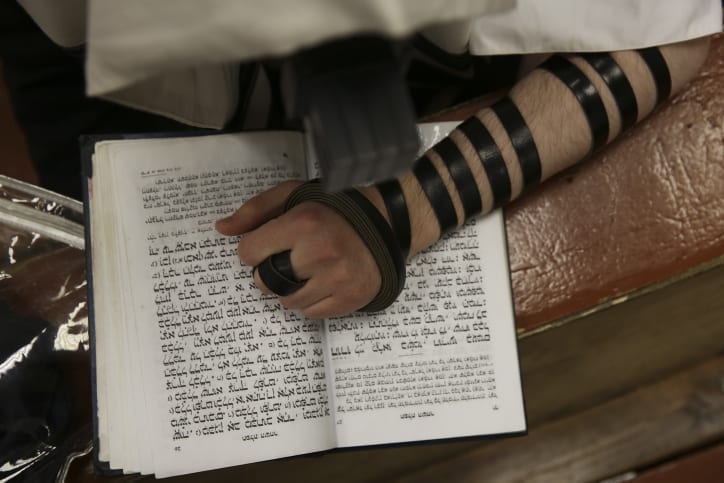“Is that a Nazi armband you’re wearing?” the man asked me incredulously.
Purim encompasses many themes – costumes, venahapochu, laYehudim haytah orah, mishloach manot, and klapping when Haman’s name is read out loud, to name a few.
The minhag of using a gragger when Haman’s name is pronounced during the reading of the megillah is an ancient one, and there is discussion among the rabbi’s concerning the regulation of the noise to ensure that it does not interfere with one’s ability to hear every word of the Megillah reading.
Yet, it is difficult to remain silent, without any reaction, to the mention of the personification of evil. Haman represents Amalek and our response implements an aspect of the mitzvah, “zachor et asher asah lecha Amalek” – “remember what Amalek did to you.” The Jewish Nation is “am levadad yishkon” – a nation that dwells alone, and our enemies have abounded throughout the generations — whether it is Pharaoh, Bilaam, Haman or modern-day nemeses – who deny our right to exist as a people and seek to annihilate us chas v’shalom.
At the end of Shacharit we have the Sheish Zechirot – Six to Remember – that we recite each day. The Darchei HaShleimus notes that only the directive to remember to wipe out Amalek includes the words, “lo tishkach – do not forget.” This is because this command is antithetical to the Jewish People’s essence.
In fact, it was Shaul HaMelech’s failure to implicitly follow Hashem’s command to annihilate the nation of Amalek that kept the ancestry alive. We find that Shaul took pity on Agag, the king of Amalek, and let him live.
We are, by nature, not a vengeful or spiteful people. We are “rachmanim bnei rachmanim” – merciful ones the sons of merciful ones, and therefore the Torah specifically admonishes us to continuously remember Amalek’s transgression.
A number of years ago I was invited to participate as the guest speaker for a communal summer Shabbos being held at a hotel. When I arrived, one of the managers was especially hospitable and accommodating. “Rabbi,” he offered, “if there is anything at all that I can do, please let me know. You will have it immediately.”
I spent the remaining time before Shabbos with the organizers of the event to check some pertinent halachik laws that had to be enforced with the hotel staff for our Shabbat stay. I then had the privilege of enjoying an incredible Shabbat with a few hundred young people. We davened and learned together; we had the meals together and sang zemirot.
For the Motzoei Shabbat program, an unexpectedly large crowd joined. The caterer, who had been brought in for the Shabbat, had not prepared for them and there were simply not enough cold drinks to go around. In desperation, the coordinators of the event requisitioned large bottles of soda and juice from the hotel’s supply.
As I was preparing to leave Sunday morning as I prepared to leave, I heard a knock at the door. I was surprised to see one of the organizers of the Shabbos at the door.
“What’s the problem?” I asked.
“The hotel manager gave us a bill for the soda and juice that is astronomical. Since there seems to be some rapport between you and the manager, perhaps you could accompany us to help resolve this issue.”
We went to the manager’s office and politely pointed out the ostensible mistake in the bill’s total for soda and juice.
“Well, you have to understand,” said the manager superciliously. “The soda and juice were priced per glass, which is approximately $3.00. “
One of the organizers said, “We never expected that! That is astronomical! “
The manager disdainfully responded, “Well, we have to make some money off you Jews.”
As we were so rudely reminded, we cannot be complacent for we are still in exile and Eisav sonei l’Yaakov – Esau Hates Jacob.
So when an American war veteran of World War II offered me a decorated Nazi armband with an accompanying pin I accepted it. I use it every Purim when I klap for Purim. It is a painful but effective reminder of our mandate “timcheh es zecher Amalek – obliterate the nation of Amalek .”
Purim encompasses many themes – costumes, venahapochu, laYehudim haytah orah, mishloach manot, and klapping when Haman’s name is read out loud, to name a few.
The minhag of using a gragger when Haman’s name is pronounced during the reading of the megillah is an ancient one, and there is discussion among the rabbi’s concerning the regulation of the noise to ensure that it does not interfere with one’s ability to hear every word of the Megillah reading.
Yet, it is difficult to remain silent, without any reaction, to the mention of the personification of evil. Haman represents Amalek and our response implements an aspect of the mitzvah, “zachor et asher asah lecha Amalek” – “remember what Amalek did to you.” The Jewish Nation is “am levadad yishkon” – a nation that dwells alone, and our enemies have abounded throughout the generations — whether it is Pharaoh, Bilaam, Haman or modern-day nemeses – who deny our right to exist as a people and seek to annihilate us chas v’shalom.
At the end of Shacharit we have the Sheish Zechirot – Six to Remember – that we recite each day. The Darchei HaShleimus notes that only the directive to remember to wipe out Amalek includes the words, “lo tishkach – do not forget.” This is because this command is antithetical to the Jewish People’s essence.
In fact, it was Shaul HaMelech’s failure to implicitly follow Hashem’s command to annihilate the nation of Amalek that kept the ancestry alive. We find that Shaul took pity on Agag, the king of Amalek, and let him live.
We are, by nature, not a vengeful or spiteful people. We are “rachmanim bnei rachmanim” – merciful ones the sons of merciful ones, and therefore the Torah specifically admonishes us to continuously remember Amalek’s transgression.
A number of years ago I was invited to participate as the guest speaker for a communal summer Shabbos being held at a hotel. When I arrived, one of the managers was especially hospitable and accommodating. “Rabbi,” he offered, “if there is anything at all that I can do, please let me know. You will have it immediately.”
I spent the remaining time before Shabbos with the organizers of the event to check some pertinent halachik laws that had to be enforced with the hotel staff for our Shabbat stay. I then had the privilege of enjoying an incredible Shabbat with a few hundred young people. We davened and learned together; we had the meals together and sang zemirot.
For the Motzoei Shabbat program, an unexpectedly large crowd joined. The caterer, who had been brought in for the Shabbat, had not prepared for them and there were simply not enough cold drinks to go around. In desperation, the coordinators of the event requisitioned large bottles of soda and juice from the hotel’s supply.
As I was preparing to leave Sunday morning as I prepared to leave, I heard a knock at the door. I was surprised to see one of the organizers of the Shabbos at the door.
“What’s the problem?” I asked.
“The hotel manager gave us a bill for the soda and juice that is astronomical. Since there seems to be some rapport between you and the manager, perhaps you could accompany us to help resolve this issue.”
We went to the manager’s office and politely pointed out the ostensible mistake in the bill’s total for soda and juice.
“Well, you have to understand,” said the manager superciliously. “The soda and juice were priced per glass, which is approximately $3.00. “
One of the organizers said, “We never expected that! That is astronomical! “
The manager disdainfully responded, “Well, we have to make some money off you Jews.”
As we were so rudely reminded, we cannot be complacent for we are still in exile and Eisav sonei l’Yaakov – Esau Hates Jacob.
So when an American war veteran of World War II offered me a decorated Nazi armband with an accompanying pin I accepted it. I use it every Purim when I klap for Purim. It is a painful but effective reminder of our mandate “timcheh es zecher Amalek – obliterate the nation of Amalek .”
Exemple 2. Le Money Management, ou gestion du portefeuille est tès importante. Pour rester gagnant sur le long terme, attention aux sommes mises en jeu qui pourraient mettre à mal la balance. Premièrement, toutes les options ne sont pas bonnes à négocier. cialispascherfr24 Les options Range.
0 35 3 minutes read





